Medication Safety Decision Assistant
Medication Safety Assessment Tool
This tool helps you determine if you should stop a medication immediately based on your symptoms and the type of medication you're taking. For serious reactions, time is critical.
When a drug makes you feel sick, the first thought is usually to call your doctor or wait it out. But some reactions are so dangerous that you need to stop medication immediately - even before you can get professional advice. This guide tells you which side effects are red‑flags, what actions to take on the spot, and why a handful of common medicines should never be quit cold turkey.
Serious Adverse Drug Reaction is defined as an unintended, harmful response to a medication that results in death, a life‑threatening situation, hospitalization, persistent disability, or a birth defect. Recognizing a serious adverse drug reaction early can be the difference between a quick recovery and a medical emergency.
Red‑Flag Reactions That Demand Immediate Discontinuation
- Anaphylaxis - sudden swelling of the face, throat tightness, hives, or a drop in blood pressure. It can strike within minutes of taking a drug and affects roughly 1‑15 per 10,000 patients on high‑risk meds like penicillin.
- Stevens‑Johnson Syndrome (SJS) and Toxic Epidermal Necrolysis (TEN) - painful blistering rash that spreads rapidly, often starting on the trunk. Mortality climbs to 15% for SJS and up to 50% for TEN. Triggers include carbamazepine, lamotrigine, allopurinol, and sulfonamides.
- Acute Liver Failure - nausea, vomiting, jaundice, and a sudden spike in liver enzymes (ALT >3× ULN with symptoms, >5× without). Isoniazid and several antiepileptics are known culprits.
- Agranulocytosis - fever, sore throat, and a dangerously low white‑blood‑cell count. Drug‑induced cases happen in 1‑15 per million users and can be fatal if not stopped right away.
When you spot any of these, stop the drug, call emergency services (or go to the nearest emergency department), and bring the medication bottle with you. Time matters.
When to Pause and Call a Provider Within Hours
Not every severe‑looking reaction requires an instant halt. Some skin eruptions without mucosal involvement, sudden kidney function drops, or severe dizziness may be serious but allow a brief window (24‑48 hours) to arrange a professional review. In these cases, document the symptom (date, time, dose) and contact your prescriber as soon as possible.
Medications That Must Never Be Stopped Abruptly
Even if a drug feels uncomfortable, pulling the plug suddenly can cause its own set of life‑threatening problems. The following classes are notorious for withdrawal syndromes or rebound effects:
- Beta Blockers - abrupt cessation can spark rebound hypertension in 12‑25% of patients and precipitate a heart attack in those with coronary artery disease.
- Benzodiazepines - sudden stop can trigger seizures in 10‑15% of long‑term users and severe anxiety.
- Antidepressants (especially SSRIs and SNRIs) - discontinuation syndrome ranges from mild dizziness to intense flu‑like symptoms in 20‑50% of patients.
- Clonidine and other central α‑agonists - rapid withdrawal often leads to a dangerous spike in blood pressure.
- Prednisone and other systemic steroids - stopping too fast can cause adrenal insufficiency.
For these drugs, the safer route is a physician‑guided taper, reducing the dose gradually over days or weeks.
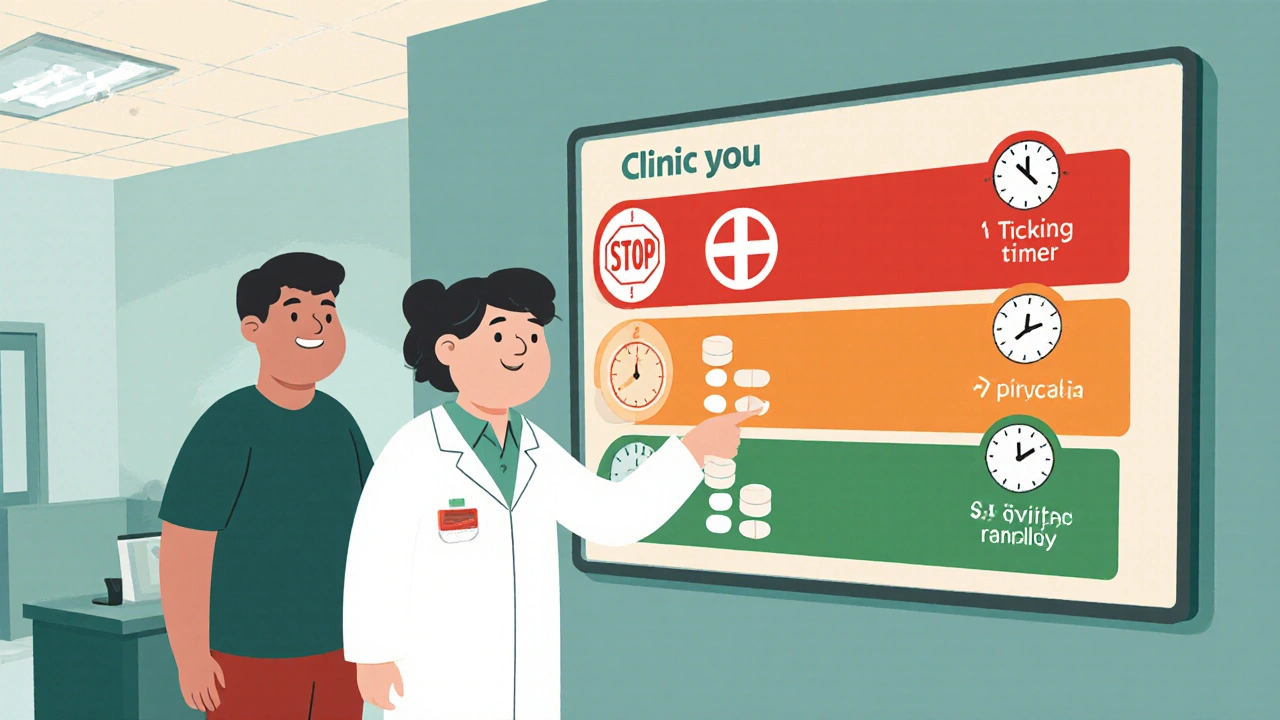
Fast Decision Tools You Can Use at Home
Clinicians rely on structured checklists to avoid guesswork. Two of the most practical frameworks are easy to adapt for patients:
The 5‑Question Decision Framework (Weill Cornell CERT)
- Is the reaction potentially life‑threatening? If yes, stop immediately and seek emergency care.
- Does the medication belong to a class that causes withdrawal syndromes? If yes, do not stop cold turkey - arrange a taper.
- Are there safer alternative treatments available?
- What is the risk‑benefit ratio of continuing versus stopping?
- Do you understand the plan and consent to it?
Tiered ADR Guidance (American College of Physicians, 2022)
| Tier | Action | Examples |
|---|---|---|
| 1 | Stop immediately | Anaphylaxis, SJS/TEN, acute liver failure, agranulocytosis |
| 2 | Discontinue within 24‑48 hrs | Severe rash without mucosal involvement, rapid renal impairment |
| 3 | Consider tapering | Persistent nausea, dizziness, mild liver enzyme rise |
| 4 | Continue with monitoring | Mild headache, transient mild nausea |
Use the tier chart as a quick reference when you’re unsure.
Step‑by‑Step Action Plan for Immediate Discontinuation
- Identify the red‑flag: Look for swelling, rash that blisters, severe abdominal pain, fever with sore throat, or any sudden organ‑specific symptom.
- Cease the drug: Put the pill bottle down, do not take another dose.
- Call emergency services (911 or your local number) if you have any of the Tier 1 reactions. Mention the drug name and dose.
- If no emergency needed, contact your prescriber within the next few hours. Provide a concise symptom log: date, time, dose, and what you felt.
- Bring the medication packaging to any medical encounter. The label contains crucial info for clinicians.
- Do not self‑taper a Tier 1 drug. Even if you feel better after a single dose, the reaction could recur.
Having this checklist on your phone or printed on a fridge note can save precious minutes.
Common Misconceptions and Why They’re Dangerous
Many patients think “if it hurts, just stop.” While that’s true for life‑threatening reactions, it’s wrong for drugs that cause withdrawal. A Reddit thread from 2023 shows 42% of people stopped their statin because of muscle pain, yet only 5% actually had true statin‑induced myopathy. Most could have switched to a different statin or lowered the dose.
Another myth is that “all side effects are mild.” In reality, the FDA tracks about 1.3 million emergency department visits each year due to adverse drug events, and roughly a quarter of those result from reactions that should have prompted an immediate stop.
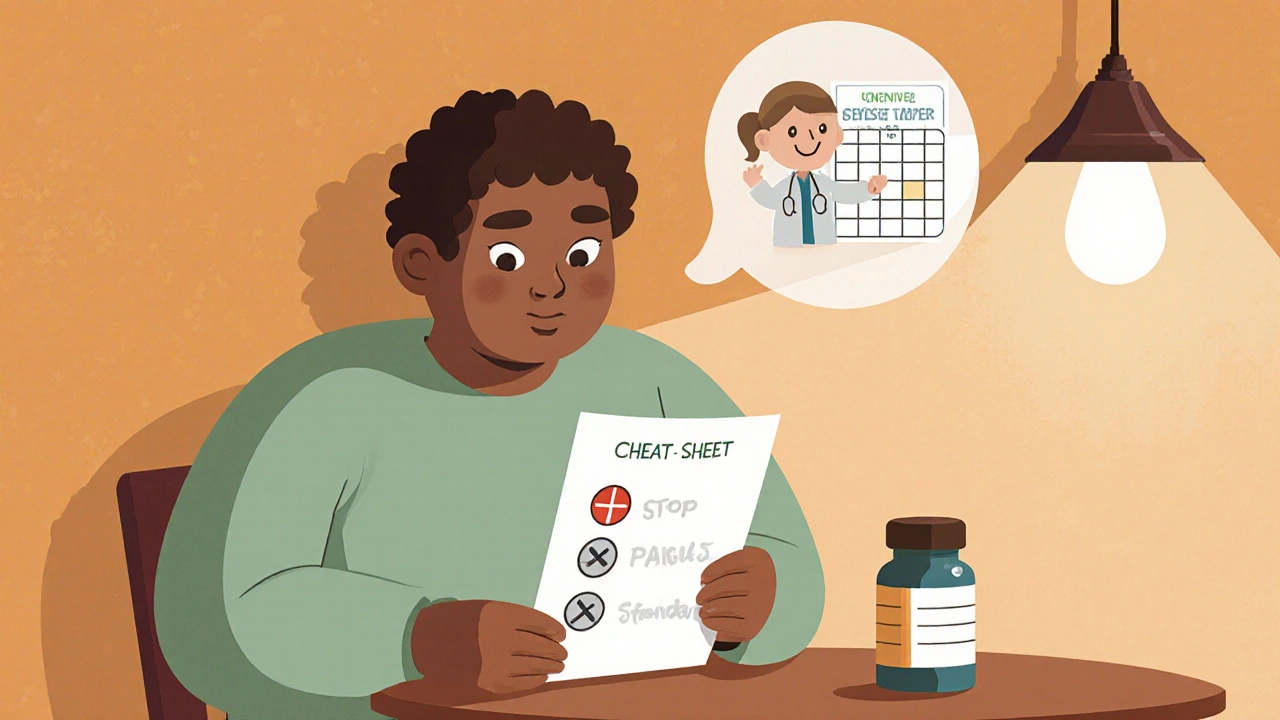
How Healthcare Professionals Decide
Doctors combine clinical judgment with tools like the STOPP/START criteria (Screening Tool of Older Persons’ Prescriptions/Screening Tool to Alert to Right Treatment). The criteria flag medications that are high‑risk for older adults and recommend deprescribing or dose reduction. When a serious ADR appears, they consult the drug’s label-many have black‑box warnings that say “Discontinue at first sign of rash” for carbamazepine in patients with the HLA‑B*1502 allele.
Pharmacists play a key role too. The American Pharmacists Association 2023 guidelines ask pharmacists to run a structured medication review, check for interactions, and counsel patients on tapering schedules-especially for SSRIs, where FDA‑mandated labels now include step‑down dosing charts.
Quick Reference Cheat Sheet
- Stop now: Anaphylaxis, SJS/TEN, acute liver failure, agranulocytosis.
- Stop within 48 hrs: Severe non‑blistering rash, rapid kidney loss.
- Taper only: Beta blockers, benzodiazepines, antidepressants, clonidine, steroids.
- Call 911 if you have airway swelling, drop in blood pressure, or loss of consciousness.
- Call your doctor for any other serious side effect that isn’t an emergency but feels alarming.
Keep this list handy on your phone or in a medicine cabinet drawer.
Resources for Further Learning
While you shouldn’t self‑diagnose, knowing where to find trustworthy info helps you feel in control. Look for FDA MedWatch alerts, the latest drug label PDF, or reputable patient‑education sites like Healthline and Mayo Clinic. If you’re on a high‑risk medication, ask your prescriber for a printed taper plan before you start.
What counts as a life‑threatening drug reaction?
Any reaction that could cause death, a severe allergic response (anaphylaxis), a blistering skin condition like SJS/TEN, acute liver failure, or a dangerously low white‑blood‑cell count (agranulocytosis) requires you to stop the drug right away and seek emergency care.
Can I stop a beta blocker if I feel dizzy?
No. Dizziness can be a sign of withdrawal. Beta blockers need a slow taper under a doctor’s guidance to prevent a rebound spike in blood pressure or a heart attack.
How fast should I act if I develop a rash after starting carbamazepine?
Stop the drug immediately. Carbamazepine carries a black‑box warning for SJS/TEN, especially in people with the HLA‑B*1502 allele. Call emergency services if the rash spreads or blisters.
Is it ever okay to stop an SSRI without tapering?
Only if you experience a serious adverse reaction like an allergic response or severe serotonin syndrome. Otherwise, follow the label’s taper schedule to avoid discontinuation syndrome.
What should I do while waiting for emergency help?
Lay flat, keep the airway open, and if you have an epinephrine auto‑injector (EpiPen) for known allergies, use it right away. Have the medication bottle ready to show responders.

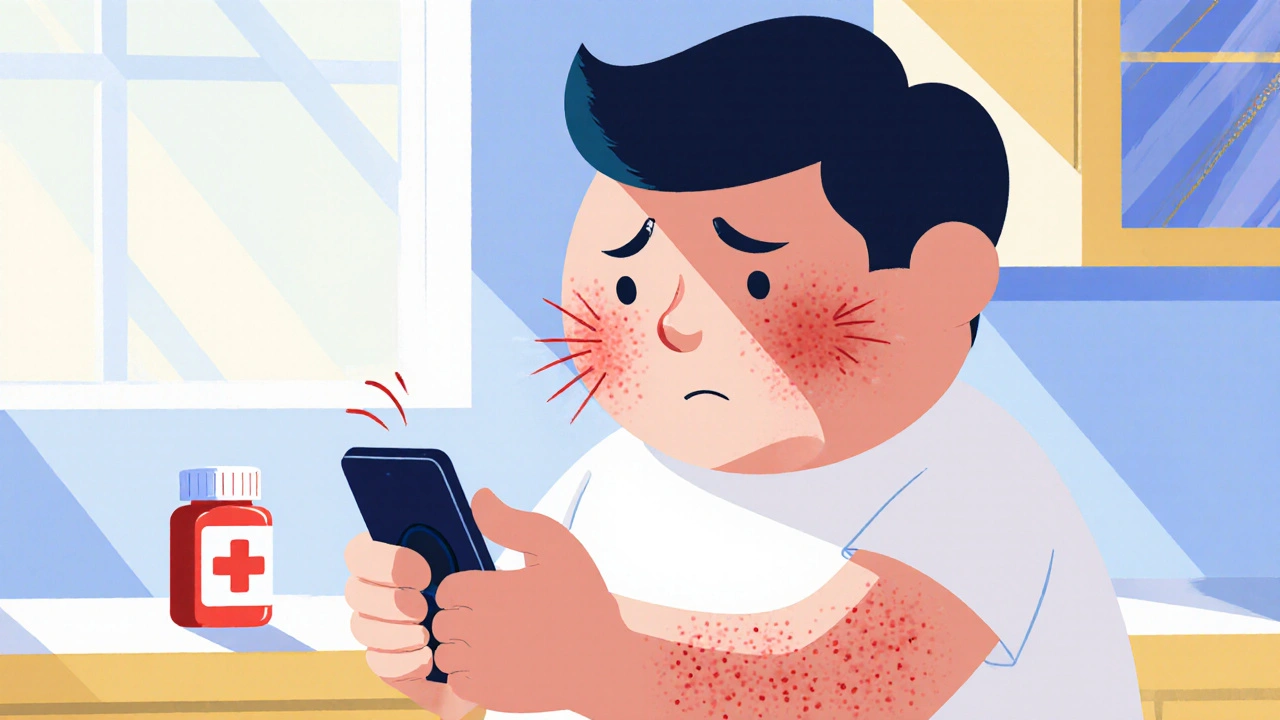
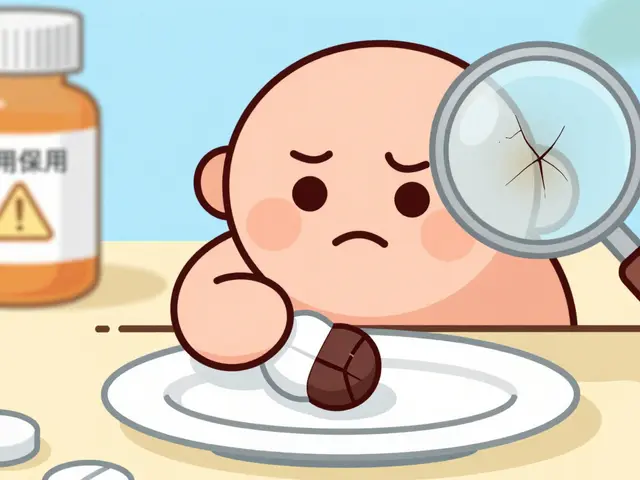
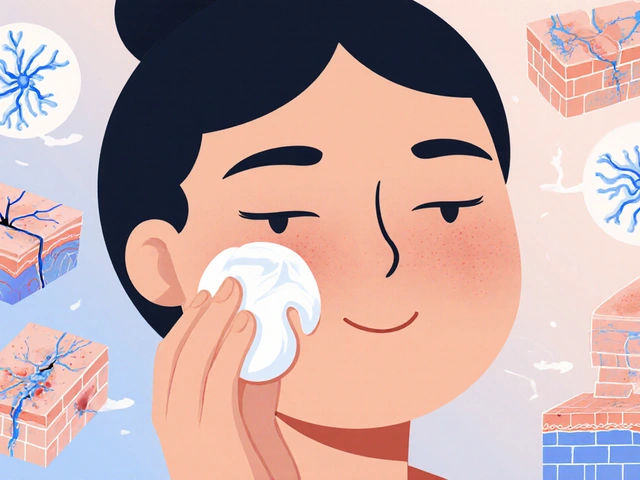
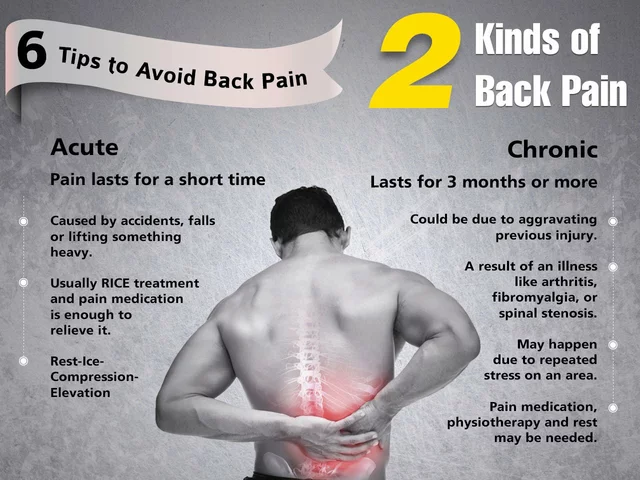
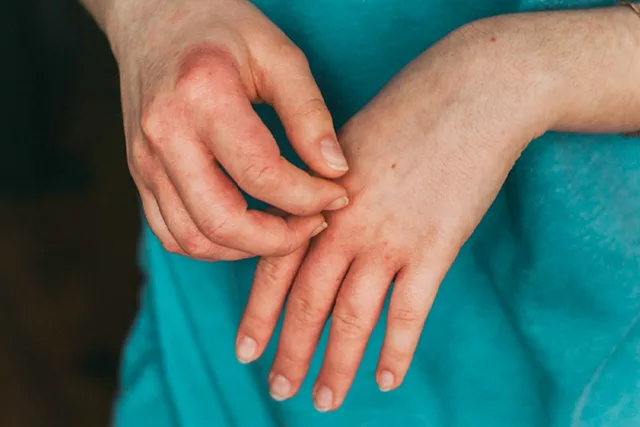
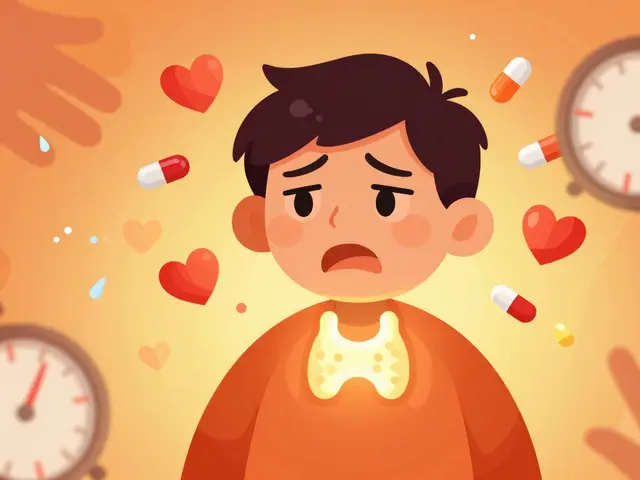
Comments(5)